- COMB(ED)
- In heraldry the crest of a domestic fowl when it is of a different tincture from its body – but
see jelloped and wattle(d) 2) (also
beaked and tinctures).
![[comb example]](../images/v/vx-de-hv-sz.gif)
![[comb example]](../images/v/vx-ch-ag093.gif)
![[comb example]](../images/v/vx-pt-prggc-gf.gif)
Flag of Seelze, Germany; Flag of Veltheim, Switzerland;
Flag of Galafura e Covelinhas, Portugal
- COMBATANT
- The heraldic term which can be used when two beasts of prey (usually, but
not invariably, lions) are shown facing each other – but
see confronting and respectant
(also affrontant).
![[combatant example]](../images/v/vx-ch-be060.gif)
![[combatant example]](../images/v/vx-de-nt.gif)
![[combatant example]](../images/v/vx-pt-almlf-lj.gif)
Flag of Leuzigen, Switzerland;
Flag of Northeim County (Germany);
Flag of Laranjeiro, Portugal
- COMBINED (or COMBINATION) FLAG (or STANDARD)
- The terms which may be used to describe a flag or flag-like image that is usually
intended to illustrate unity between those countries allied in an armed conflict – a
combination flag or standard – but see
patchwork flag 1)
(also linguistic flags 1)).
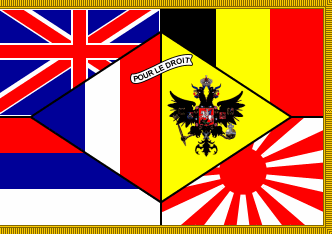
Flag showing the Allies in the Great War
c1914
- COMMAND FLAG
- See flag of command.
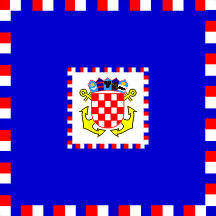
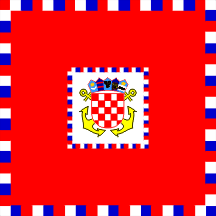
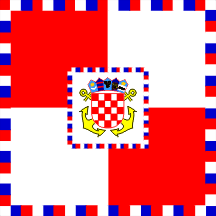
Command Flags/Flags of Command of an Admiral,
Vice Admiral and Rear-Admiral, Croatia
- COMMAND PENNANT
- 1) In naval usage, a generally triangular and/or swallow-tailed pennant flown
at sea that, unlike a flag of command, broad pennant or burgee command pennant,
does not replace the masthead pennant but which signifies an officer in command
of other ships who is below the rank of commodore – a group command pennant, flotilla
command pennant, senior officer’s pennant, squadron command pennant and others
(see also broad pennant,
broad command pennant,
burgee command pennant,
flag of command,
masthead pennant 1),
private ship and
senior officer afloat pennant).
- 2) In US usage, the command pennant of a unit equivalent to the above but of aviation or marine
forces.
![[command pennant]](../images/v/vx-gb~csq.gif)
![[command pennant]](../images/v/vx-dk~coe.gif)
![[command pennant]](../images/v/vx-nl~flotc.gif)
Squadron Command Pennants: UK;
Denmark;
Flotilla Command Pennant: The Netherlands
Notes
a) With regard to 1) – not to be confused with the senior
officer afloat pennant which (certainly in the case NATO and related services, and of countries whose navy
bases its traditions on those of the RN) is only flown whilst alongside or in harbour.
b) A distinction has been drawn between the standard masthead
pennant flown by commissioned warships (occasionally called a pennant of command), and the command
pennants as defined above that are flown subordinate to it.
c)
Further to 1), in the former Austro-Hungarian Navy and in some others, the practice of
hoisting a command pennant with (or without) the hoist being stiffened by a frame was itself indicative
of rank – see frame 2).


- COMMENDATION BANNER
- See banner 5).
![[commendation banner example]](../images/v/vx-ca^ccub.gif)
C-in-C’s Commendation Banner, Canada
- COMMENDATION FLAG (or PENNANT)
- See award flag.
![[commendation flag example]](../images/v/vx-navyunitcomm.gif)
Navy Unit Commendation Pennant, US (seaflags.us)
- COMMEMORATIVE FLAG
- A flag made to celebrate or to mark a particular occasion, such as an anniversary,
holiday or international congress – an anniversary, event or occasional flag (see also
celebratory flag and memorial flag).
![[Queens golden jubliee flag]](../images/v/vx-gb-qejub.gif)
![[WW2 US commemorative flag]](../images/v/vx-us^wwii.gif)
![[commemorative flag]](../images/v/vx-int-iaf60.gif)
Golden Jubilee of HM The Queen 2002, UK;
WWII Commemorative Flag, US;
IAF 60th Anniversary Flag
- COMMEMORATIVE FLAG CASE
- See flag case 2).
- COMMERCIAL CODE OF SIGNALS (or COMMERCIAL CODE OF SIGNAL FLAGS)
- The system which replaced Marryat’s code, and in use from 1866–1880 when it was
superseded by the international code – see ‘International Code of Signal Flags’
and Marryat's Code.
![[commerical flag example]](../images/v/vx-ics~tang.gif)
![[commerical flag example]](../images/v/vx-ics~zulu.gif)
![[commerical flag example]](../images/v/vx-ics~queb.gif)
TZQ in the 1866 Commercial Code of Signals
- COMMERCIAL FLAG
- 1. See house flag 1) and
corporate flag.
2. In UK usage a term, now obsolete, sometimes used in place of (and referring only to) a country's
Merchant Flag or Civil Ensign – see Civil Ensign,
![[commerical flag example]](../images/v/vx-gb~allas.gif)
![[commerical flag example]](../images/v/vx-gb~hfarf.gif)
![[commerical flag example]](../images/v/vx-es-1897m.gif)
House Flag of Allantone Supplies Ltd., UK;
Flag of the Arctic Steam Fishing Co. Ltd., UK;
Commercial Flag/Civil Ensign, Spain 1785–1927
- COMMERCIAL LOGO
- See logo.
![[commerical flag example]](../images/v/vx-us$mcdn2.gif)
Flag of McDonalds, Worldwide
- COMMISSIONING or COMMISSION PENNANT
- See masthead pennant 1). see supplemental
note
![[commissioning pennant]](../images/v/vx-ca~mast.gif)
Commissioning/Masthead Pennant, Canada
- COMMODORE’S BROAD PENNANT
- See broad pennant 2).
![[commodore's broad pennant]](../images/v/vx-pk~cdr.gif)
Commodore’s Broad Pennant, Pakistan
- COMMON PENDANT (or PENNANT)
- In English then British RN usage, now obsolete, a commissioning or masthead pennant (often seen) with
a split tricolour fly, that was introduced in 1661, and flown (together with a red ensign) until c1850
by warships sailing under Admiralty orders – an ordinary, or tricolour pendant, or a pendant of
independent command –, see
masthead pennant 1) (also
man o'war pendant and
red ensign 2) and
union pendant).
![[common pendant]](../images/v/vx-gb~tcp.gif)
The Common/Tricolour Pendant, England then UK 1661–c1850
Notes
a) Display of a common/tricolour pendent
became (or was designed as) a visual indication that the vessel wearing it
was under Admiralty orders and (therefore) not subject to the authority of
any local flag officer whether of the red, white or the blue –
see distinction of colour, however;
b) There is evidence to suggest that, when introduced, its use was less restricted than became the
practice later.
- COMPANY COLOURS (or COLORS)
- Small additional colours carried by foot regiments of the British and Canadian
Brigade of Guards, and a survival of the general 16th/17th century practice of
carrying a colour for each company in a regiment – camp colours or silks (see
also camp colour 1),
colour 2),
colours 2),
postures,
stand of colours 1) and
venn).
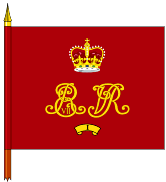

Company Colour, No 1 Company, 1st Battalion of The Irish Guards, UK (Graham Bartram); No 2 Company,
Governor General’s Foot Guards, Canada (official website)
Please note that, while ten was the theoretic maximum, and six or seven the more usual, a regimental
stand of nine colours was not unknown for an English regiment of foot in the mid-17th century.
- COMPANY FLAG
- See corporate flag.
![[company flag example]](../images/v/vx-gb$boac.gif)
Flag of BOAC, UK
- COMPARTMENT
- 1) In heraldry, the symbolic base upon which a shield and supporters may rest
in a full set of armorial bearings – but compare with coupeau
and mount (see also
Appendix IV,
armorial bearings,
shield and
coat of arms).
- 2) On flags see
cartouche 2).
![[compartment example]](../images/v/vx-za)old.jpg)
![[compartment example]](../images/v/vx-ukcomm.jpg)
![[compartment example]](../images/v/vx-tz).gif)
National Arms 1932–2000, South Africa;
A Flag for Generals at Sea 1649–1653, England (flaggenplatz.ch);
National Arms, Tanzania
- COMPASS ROSE
- A charge that shows the part of a device which indicates the cardinal points of direction, and is
generally seen in the form of a (usually but not invariably facetted) four or multi-pointed star –
see faceted.
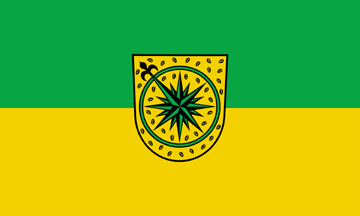
Flag of Nordwestuckermark, Germany
- COMPLEMENT
- 1) In the International Code of Signals, two or more flags or pennants added
to a basic signal to give clarity or precision to the message (see also
international code of signal flags,
international code of signals and
signal flag).
- 2) In heraldry a full moon – see moon 2) with following note.
- COMPLETE (ARMORIAL) ACHIEVEMENT
- In heraldry see armorial bearings and
achievement of arms.
![[Cambridge]](../images/v/vx-gb-e-cmbcc.gif)
![[Duke of Wellington arms]](../images/v/vx-dukewellington.gif)
![[Bexley]](../images/v/vx-gb-e-glb.gif)
Flag of Cambridge, UK; Arms of
the Dukes of Wellington, UK (Wikimedia);
Flag of Bexley, UK
- COMPLIMENTARY FLAG
- See courtesy flag.
- COMPONY
- The heraldic term used when an ordinary or a border is composed of squares (or occasionally
rectangles) in alternating tinctures – gobony, gobone or gobonated (see also
counter-compony,
ordinary and
tincture).
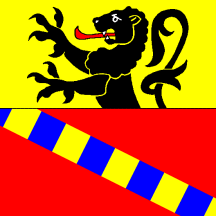
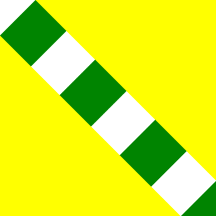
Flag of Estévenens, Switzerland;
Flag of Bougy-Villars, Switzerland
- COMPONY COUNTER-COMPONY
- In heraldry see counter-compony.
![[combatant example]](../images/v/vx-ch-ag136.gif)
Flag of Zeihen, Switzerland
![[comb example]](../images/v/vx-de-hv-sz.gif)
![[comb example]](../images/v/vx-ch-ag093.gif)
![[comb example]](../images/v/vx-pt-prggc-gf.gif)
![[combatant example]](../images/v/vx-ch-be060.gif)
![[combatant example]](../images/v/vx-de-nt.gif)
![[combatant example]](../images/v/vx-pt-almlf-lj.gif)




![[command pennant]](../images/v/vx-gb~csq.gif)
![[command pennant]](../images/v/vx-dk~coe.gif)
![[command pennant]](../images/v/vx-nl~flotc.gif)
![[commendation banner example]](../images/v/vx-ca^ccub.gif)
![[commendation flag example]](../images/v/vx-navyunitcomm.gif)
![[Queens golden jubliee flag]](../images/v/vx-gb-qejub.gif)
![[WW2 US commemorative flag]](../images/v/vx-us^wwii.gif)
![[commemorative flag]](../images/v/vx-int-iaf60.gif)
![[commerical flag example]](../images/v/vx-ics~tang.gif)
![[commerical flag example]](../images/v/vx-ics~zulu.gif)
![[commerical flag example]](../images/v/vx-ics~queb.gif)
![[commerical flag example]](../images/v/vx-gb~allas.gif)
![[commerical flag example]](../images/v/vx-gb~hfarf.gif)
![[commerical flag example]](../images/v/vx-es-1897m.gif)
![[commerical flag example]](../images/v/vx-us$mcdn2.gif)
![[commissioning pennant]](../images/v/vx-ca~mast.gif)
![[commodore's broad pennant]](../images/v/vx-pk~cdr.gif)
![[common pendant]](../images/v/vx-gb~tcp.gif)


![[company flag example]](../images/v/vx-gb$boac.gif)
![[compartment example]](../images/v/vx-za)old.jpg)
![[compartment example]](../images/v/vx-ukcomm.jpg)
![[compartment example]](../images/v/vx-tz).gif)

![[Cambridge]](../images/v/vx-gb-e-cmbcc.gif)
![[Duke of Wellington arms]](../images/v/vx-dukewellington.gif)
![[Bexley]](../images/v/vx-gb-e-glb.gif)


![[combatant example]](../images/v/vx-ch-ag136.gif)


